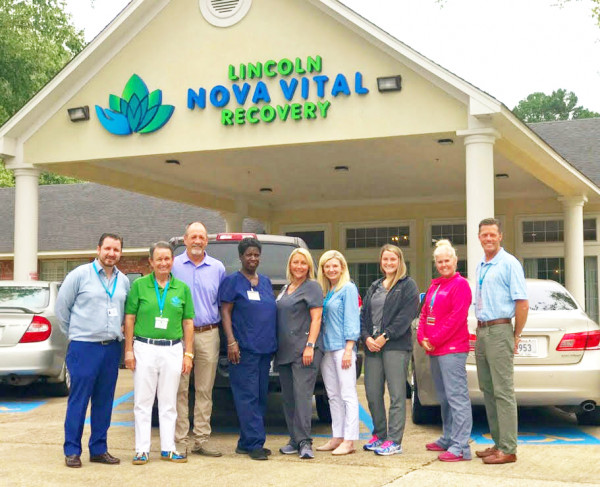Cries for help

Courtesy photo
Members of the team serving the needs of those struggling with addiction through services at Lincoln Nova Vital Recovery are (left to right) Jonathan Gamble, Kit Gamble, Dr. Randy Davis, Jackie Whitley, Amanda Williams, Susan Colbert, Lacy Vincent, Jennifer Boyce, and Jim Henry.
The ongoing COVID-19 crisis continues to disrupt the daily routines of businesses, schools, churches, and other entities as well as the daily lives of individuals.
In an article written for the Addiction Center, Hayley Hudson said just as the disease impacts almost everything else in life, it has also impacted the world of addiction and recovery.
She wrote that addiction attacks the body in a multitude of ways that includes weakening the immune system and destroying internal organs through damage, including the lungs. These are among serious health conditions that can make individuals more vulnerable to the symptoms of COVID-19, causing the National Institute on Drug Abuse to state that “COVID-19 poses a serious threat to smokers and people with a substance abuse disorder.”
Hudson also wrote that “physical and mental health is a major concern for those currently battling a substance use disorder, as well as those in recovery who are being separated from their social circles. Feelings of fear and anxiety may hold people back from seeking or continuing addiction treatment, when that treatment may be the key to saving their life.”
Edie DeVilbiss, a former addiction counselor with the 3rd Judicial Drug Court, said that anytime people are under stress, they go back to their earliest coping strategies.
“Any bad habit an individual has managed to change is likely to recur under extraordinary stress, something that certainly applies to the addiction community,” DeVilbiss said. “Those in the grips of addiction may be clean but extremely vulnerable to a relapse. The hold addiction has on a person is so strong because it becomes like a survival instinct. Your body thinks it has to have the substance in order to survive, and high levels of stress can trigger that need.”
The extraordinary circumstances surrounding COVID-19 make the likelihood of an addict relapsing extremely high. The American Society of Addiction Medicine says that because of social isolation, anxiety, and stress associated with the COVID-19 pandemic response, the risks associated with substance use will likely increase.
That means it is crucial for addiction treatment to remain accessible, while providing a safe and therapeutic environment for patients and staff.
Jackie Whitley, a detox technician with Lincoln Nova Vital Recovery, is on a team serving those who struggle with addiction. She said that from addiction recovery to mental health issues, they work to help individuals through a myriad of services. But she also said that there has been a definite change in those admitted during the height of the COVID-19 crisis.
“We’ve seen an increase in homelessness, people tired of struggling by themselves due to self-isolating, heightened desperation, and more and more coming in with no clean clothes or food,” Whitley said. “There have been incredible struggles and intense shame. But we can’t turn away from this because addiction doesn’t discriminate. It affects us all, just like COVID-19.”
Whitley said that understanding where addicts come from can be extremely challenging, adding it is critical to accept that many addicts are afraid and can easily retreat, even if you are doing everything you can for them, adding that the chaos taking place in the world makes the situation even worse.
“The violence, hate, racism, and conflict intensify problems the addicts are dealing with,” Whitley said. “There are so many ways the condition of the world is making it more and more difficult for addicts to deal with their recovery and therefore the work of the staff is challenged even more. The level of their compassion is unparalleled.”
Motivational author and speaker Vempre Terrell, Jr., has also seen the effects COVID-19 has had on the most vulnerable, crafting his message to reach them where they are.
“I’ve had opportunities to become aware of individuals who are struggling with substance abuse as well as families with loved ones who have committed suicide due to the negative mental health effects spanning from COVID-19,” Terrell Jr. said. “Grieving the loss of employment, loss of loved ones, and loss of normalcy are key reasons why alcohol and drug abuse are on the rise.”
DeVilbiss said that community is hugely important in recovery, adding that recovery allows relationships to come back into an individual’s life and so the fear of losing that again makes relapse even more fearful.
“The isolation situation makes the relationship piece more difficult, creating a void that addiction can crawl into,” DeVilbiss said. “COVID-19 has certainly made the dangers of isolation a reality for us all.”

